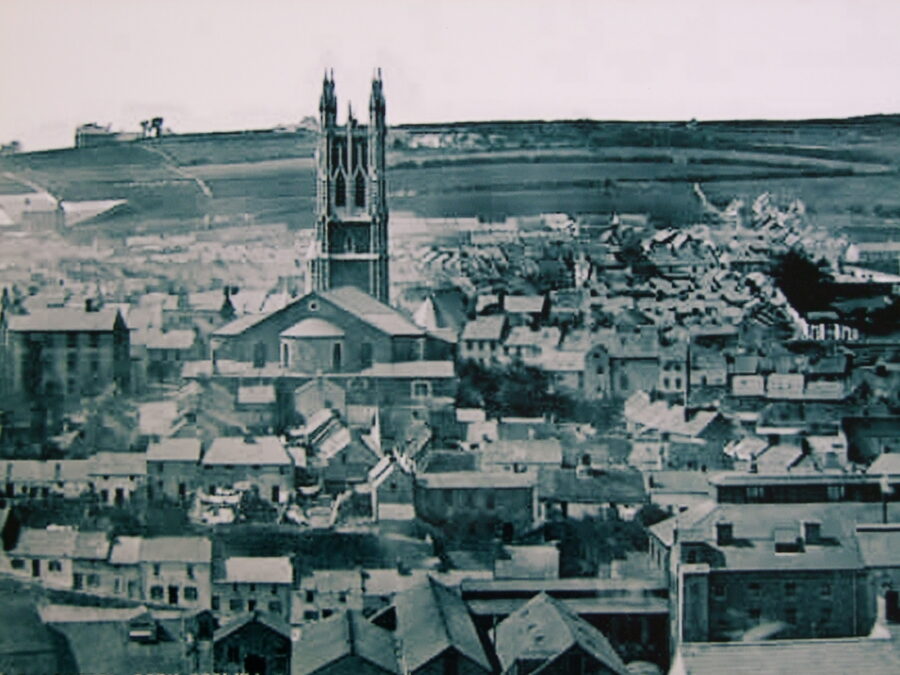
Kieran’s Our City, Our Town Article,
Cork Independent, 9 January 2025
Making an Irish Free State City – Fr O’Flynn and the Shakespeare Mission
Fr Seamus O’Flynn’s championing of community life in his North Parish was exemplary. In 1911, the Christian Brothers at the North Monastery Schools celebrated their centenary. They decided to put on a pageant of Irish mythology and history and invited their past pupil, Fr O’Flynn, to act as producer. He took on the project and soon after he was scouring the shelves of the libraries in Cork for books on Irish mythology. He produced a pageant, which the North Monastery community was proud of. Pictures of the pageant still adorn the corridors of even the modern day North Monastery schools.
The Irish Outlook, a weekly review of literary and social events, said of Fr O’Flynn in July 1912; “There is a strong magnetic quality in his personality; the magnetism that sways, that encourages, that inspires with hope and confidence. He is enthusiastic and has a multitude of interests, all national in character. His energetic mind is devoted to the re-establishing of the native language, and swayed by his enthusiasm many readily enrol themselves under his intrepid banner. As an orator, he possesses eloquence of a high order; his indisputable and his power to grip and hold an audience unique”.
Arising from his explorations of Irish culture in West Cork Fr O’Flynn believed in a revival of the Gaelic tradition. He became president of the Gaelic League in Cork City and acted as chairman of the Munster Feis. He continued to bring energy to the activities he organised. In the autumn of 19I7 he delivered six lectures to Gaelic Leaguers in Bolton Street Technical School, Dublin on Irish music and on Shakespearean dramas.
In 1918 Fr O’Flynn became a member of the newly appointed sub-committee of the Cork Municipal School of Music. He travelled to Belfast and asked traditional Irish music arranger and specialist Carl Hardebeck to accept the positions of Professor of Irish Music and the Headmastership of the Cork Municipal School of Music. Carl Hardebeck was convinced and agreed to come to Cork. The core issue back in Cork though was Carl’s German origins. The teaching staff resigned in protest at the appointment of a German headmaster in light of the First World War. A complete suite of new staff were appointed.
The Oireachtas – the annual festival of language, song, poetry, music, dancing and games of the Gaelic League – was held in Cork city from 3 to 9 August 1919. Fr O’Flynn had worked on several of the committees to ensure the success of this event.
In 1924 the nuns of St Vincent’s Convent School, Peacock Lane, asked Fr O’Flynn to help students of theirs to stage a scene from The Merchant of Venice. Two girls involved in this event were Kathy Hickey and Eileen Curran. About this time Fr O’Flynn began to develop his idea of establishing classes for the study of Shakespeare’s plays. In November 1924, the Cork Shakespearean Company commenced. Almost all members of the Company came from the area around the North Cathedral. This was a slum ridden area and very much at the heart of Fr O’Flynn’s work as well was to lift people out of poverty and give them opportunities and hope.
Among the first members were Eddie Golden, James Stack, Tom Vesey, Harry McCarthy, Roly Hill, Peadar Houlihan, Leo Griffin, Harry Weldon, Ken O’Shea, Dan Skidd, the Buckley brothers Daniel and James, the Flanagan brothers, the Healy brothers Gus, Ted and Jerome, and the Archer brothers Liam and Fred. The ladies of the Company included Eilen Curran, Kathy Hickey, Betty Arrow, Rita Coughlan, Maeve and Ina Cronin, Annie Hickey, May and Rita O’Neill , Nan Power, Rose Dennehy, Evelyn (“Fluffy) Clancy, Kitty Nott and Lena Long.
At first, classes took place in the Presbytery of the North Chapel, then in room over a shoemaker’s shop in Gerald Grifin Street. Fr O’Flynn’s players ranged in age from 12 to 26. Gradually a repertoire of Shakespearean plays was built up. It was time to go on the road and soon the company was fulfilling engagements at a number of halls in the city.
In the mid-1920s, the Cork Shakespearian Company presented plays of Shakespeare in full or in extract at places such as the Municipal Hall, Kinsale, The Palace, Fermoy, Fr Matthew Hall, Cork, The Ursuline Convent, Blackrock. They also gave open-air performances in a number of venues – the Mardyke Cricket Grounds, UCC (where they presented Twelfth Night), as well as Kinsale, Fermoy and Mallow. They put on Richard III in a disused mill at Newcestown near Bandon.
For example the Cork Examiner records that on Sunday evening, 19 April 1925, Twelfth Night, one of Shakespeare’s comedy plays, was staged at the Gymnasium, Collins’ Barracks, Cork, by the North Parish Shakespearean Society. This play had been produced at the Palace Theatre with exactly the same cast. Public sentiment deemed it to be one of the best amateur efforts seen in Cork within the recollection of many older citizens who would come out to support Shakespeare’s works. The Cork Examiner wrote in praise of Fr O’Flynn; “The generosity of the Rev Fr O’Flynn and his talented society in producing this play for the entertainment of the troops is deeply appreciated by the General Officer Commanding and Entertainment Committee”.
To be continued…
Caption:
1286a. North Cathedral area, Cork, c.1920 (source: Cork City Library)